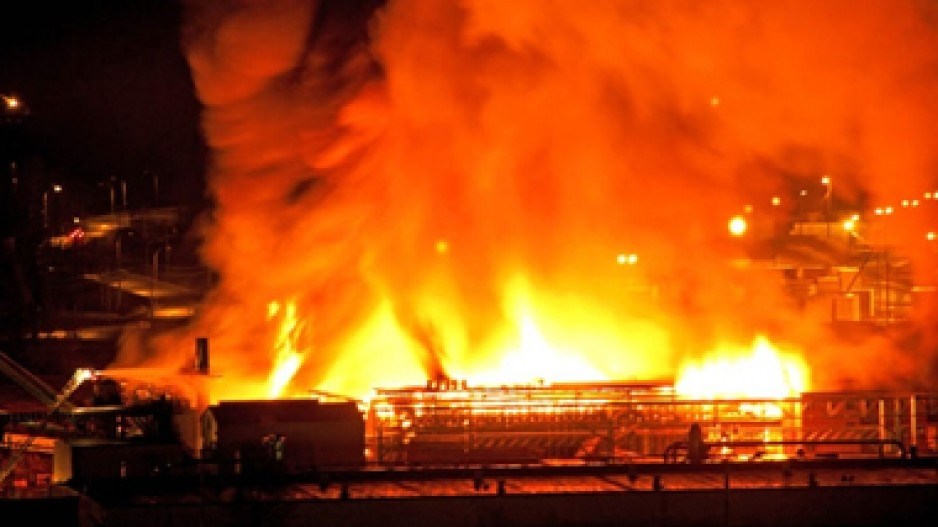The coroner’s inquest into the deaths of two employees resulting from the explosion of Lakeland Mills’ sawmill came to an end May 14 with a jury concluding the deaths were accidental and issuing more than 30 recommendations to prevent similar disasters in the future.
Glenn Roche, 46, and Alan Little, 43, died from the severe burns they suffered in the April 23, 2012 explosion that destroyed the sawmill.
The blast also left more than 20 others who were in the facility at the time with injuries, many of them serious.
Accidental means the deaths were the result of unintended or unexpected events.
The outcome brought little satisfaction to Roche's widow, Ronda Roche, who continued to call for a full public inquiry into the disaster at Lakeland and into a similar explosion that leveled Babine Forest Products near Burns Lake on
Jan. 20, 2012, also killing two workers and injuring more than 20 others.
Although she commended those involved in the inquest for helping to shed light on the causes of the explosion, its inability to assign blame was a shortcoming for Roche.
"It is unfortunate that these proceedings did not assign fault or accountability," Roche said.
She said the inquest confirmed many of her suspicions, from a decline in the level of the mill's cleanliness to running new equipment without installing accompanying waste disposal systems to management ignoring employees' concerns.
Most importantly, said Roche, management "found it reasonable to run a third shift without properly assessing the changes in the work environment, which ultimately led to excessive amounts of fuel within the facility."
A large proportion of the wood being run through the sawmill was beetle-killed pine which produces a particularly fine and dry dust that floated in the air and would cling to railings, beams and machinery.
Although acknowledged as a fuel for fires, officials who testified at the inquest repeatedly said the potential for a wood-dust fueled explosion in an area as large as a sawmill was not recognized prior to the two blasts, which occurred within less than 90 days of each other.
Roche also took WorkSafeBC to task for "missed opportunities" for inspectors to deal with the problem before the explosion and for a botched investigation that caused the criminal justice branch to reject a request to pursue regulatory charges against the mill's owners.
WorkSafeBC has since levied a $724,163 penalty against Lakeland's owners, which is in the process of being appealed.
Roche said the inquest did help "fill in the blanks" in terms of details of what happened.
"It has been an emotional journey for my self, my family and the injured workers," Roche said.
Little's father, John, had similar comments.
"As far as I'm concerned, accountability wasn't determined and if accountability wasn't determined, then justice has not been served," Little said.
"On the other side, hopefully with the recommendations that were made that the workers in the future will work in a safer environment."
One of the jury's recommendations was for the United Steelworkers to mail out its newsletter to the homes of members working in the wood manufacturing industry so that "family members are aware of safety issues in the workplace" and allow them to be part of the safety process.
Roche thought it was a good idea, noting her husband voiced his concerns about the state of the mill to her prior to the disaster. Instead of urging him to calm down, Roche said she "probably would have pushed him a little harder to be heard" had she received such a newsletter.
Like Roche, Greg Stewart, president of Sinclar Group, sat through virtually all of the inquest.
"Obviously, we've just received all of the recommendations so we'll need to take some time to review them but I believe that they will move us toward a safer industry," Stewart said.
Like he did when he testified at the inquest, Stewart said he was "incredibly sorry that this event has happened and my heart goes out to the families as well as to the injured employees and their families."
Another of the jury's recommendations called for all new sawmills and upgrades to existing sawmills "be made to the highest possible standard," and pointed to the rebuilt Lakeland Mills facility, which began operation in December, as a good example.
Asked about that, Stewart said he hopes the new mill shows Sinclar Groups commitment to a safer industry.
He said a moment of silence every April 23 on both the morning and afternoon shifts in remembrance of what occurred "will continue as long as Lakeland is around."
In all, the jury heard from 54 witnesses during four-and-a-half weeks of testimony that ran from March 2 to 25 and then from May 11 to 14, as the inquest was put on hold for a time to allow counsel to review new information in the form of an investigation into the blast conducted on behalf of the sawmill's owners.



